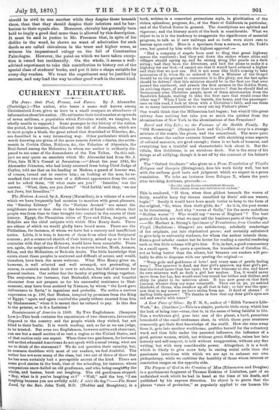The "Oxford Graduate" who gives us a Prose Translation of
Virgil's Eclogues and Georgics (Rivingtons), does his work fairly well, but not with the uniform good taste and judgment which we expect in a prose translation. We take an instance from Eclogue X, where the poet: after invoking Arethusa, proceeds : —
" sic tibi, etnn iluctus subterlabere Simms,
Doris amara roam non intermisseat undam."
This is rendered, "If thou, when thou glidest beneath the waves of Sicily, would'st keep thy stream unsullied by Doris' salt-sea waters, begin! " Surely it would have been much better to keep to the form of the original, "So, when thou shalt-glide, &c." As it is, the poet seems to be threatening. And why "waves of Sicily," for the more melodious "Sicilian waves " ? Who would say "waves of England " ? The best parts of the book are what we may call the business parts of the Georgics.
Mr. Herbert A. Strong's Specimens of Translations from Catullus and Virgil, (Maclehose : Glasgow) are satisfactory, scholarly renderings of the originals, put into rhythmical prose ; and certainly calculated to give help to university students, for whom the author intends them. Even a good scholar cannot but be better for reading a careful rendering such as this little volume will give him. It is, in fact, a good commentary in a small space. We quote a specimen, the translation of Catullus not as being better than the others, but because our readers will pro- bably be able to dispense with our quoting the original:—
" Weep gods and goddesses of love ! and every man of gentle feeling weep ! The sparrow is dead, my dear girl's sparrow, my dear girl's pet, that she loved more than her eyes; for it was winsome as she, and knew its own mistress well as doth a girl her mother. Yea, it would never move from her lap, but would ever hop round her hither and thither, and chirp its plaint to its mistress alone. It has now gone on that dark journey, whence they say none returneth. Then out on ye, ye unkind shadows of Orcus, who swallow up all that is fair ; so fair was the spar- row that to my sorrow ye have stolen from me. 0 deed of shame ! 0 darling little sparrow ! 'Tis thanks to thee that my dear girl's eyes are red and sworn with tears!"






























 Previous page
Previous page